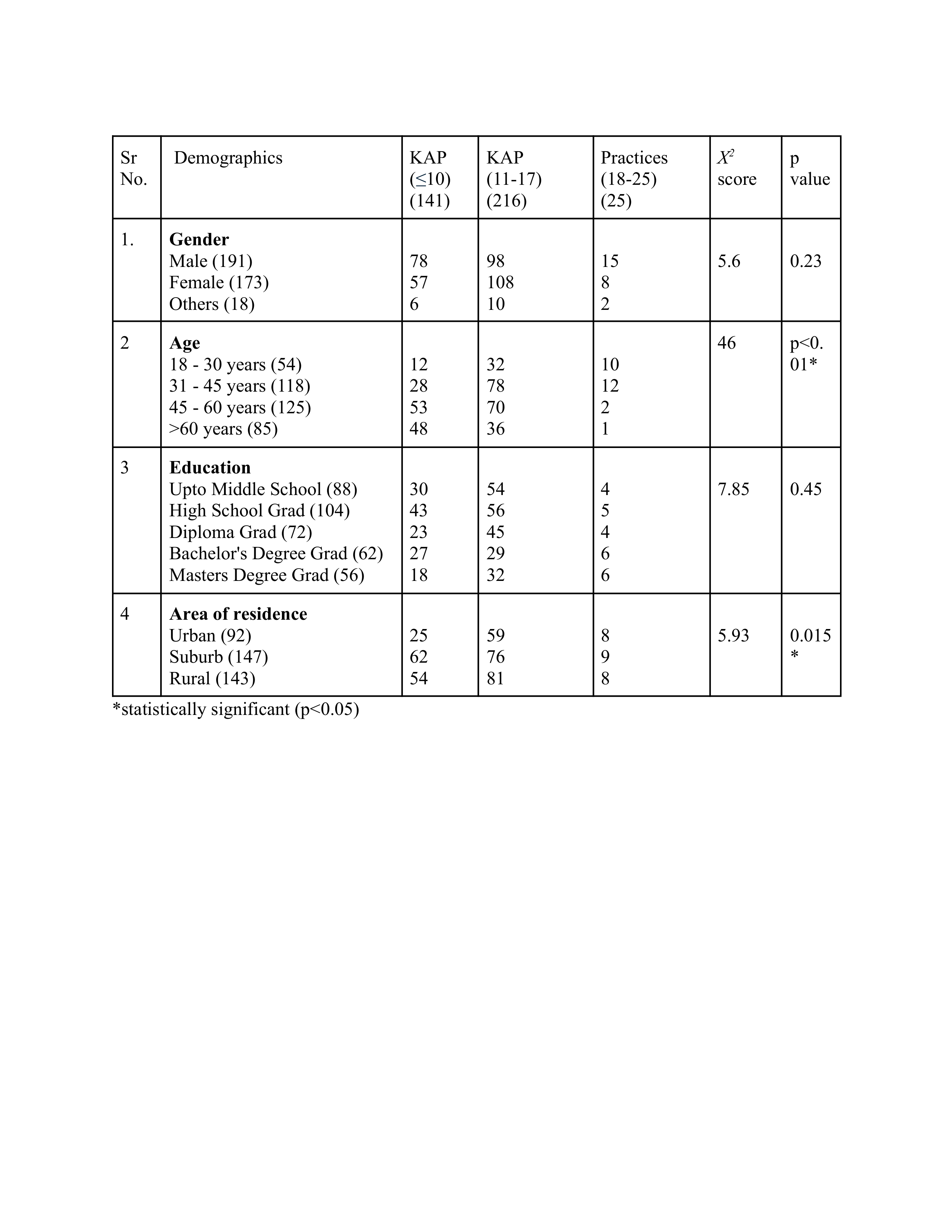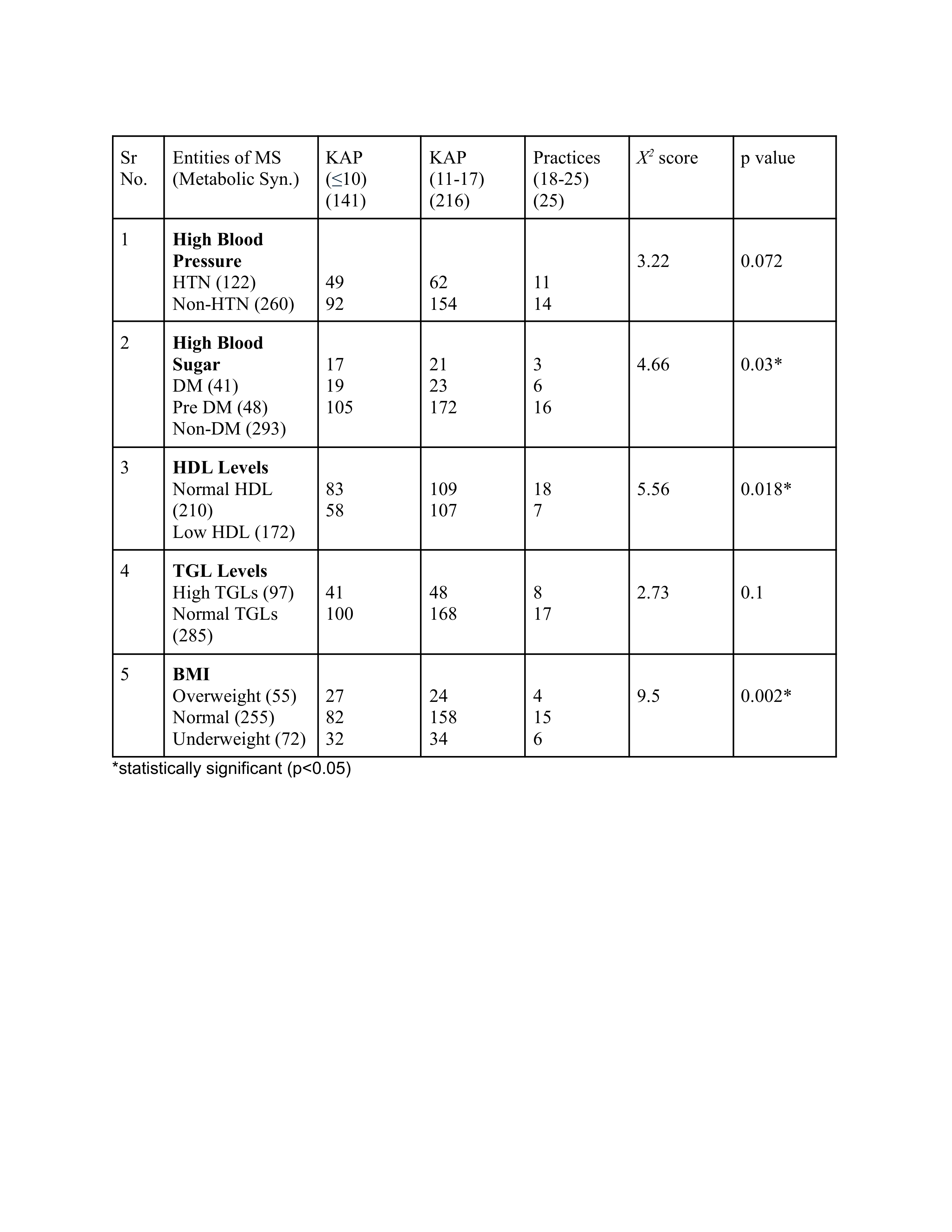Tuesday Poster Session
Category: Diet, Nutrition, and Obesity
P4842 - Assessing Knowledge, Attitude, and Practices of the Mediterranean Diet Plan (MDP) and Its Association With Entities of Metabolic Syndrome
Tuesday, October 28, 2025
10:30 AM - 4:00 PM PDT
Location: Exhibit Hall
- MB
Maureen Bett
International University of Health Sciences
Chicago, IL
Presenting Author(s)
Jugal Hiren. Bhatt, MBBS1, Nency Kagathara, MBBS2, Kahan Mehta, MBBS3, Ujjwal P. Dutta, MBBS3, Bhoomi Bavadiya, MBBS3, Maurya Joshi, MBBS3, Tithi Manjibhai. Savani, MBBS4, Maureen Bett, 5, Linda Bett, 5
1GMERS Medical College and Hospital Gotri, Voorhees, NJ; 2Zydus Medical College and Hospital Dahod, Vadodara, Gujarat, India; 3GMERS Medical College and Hospital Gotri, Chicago, IL; 4GMERS Medical College and Hospital Sola, Chicago, IL; 5International University of Health Sciences, Chicago, IL
Introduction: Globally, there is a rising trend in the prevalence of non-communicable diseases (NCDs) and its significantly stronger risk factor is metabolic syndrome. There is a need to change our diet plan to the Mediterranean which has proven benefits in cardiovascular health. The aim of this study is to determine the knowledge, assessment and practices (KAP) towards MDP and its association with entities of metabolic syndrome among a random Asian population.
Methods: A questionnaire with a total score 25 was framed considering 10 knowledge, 10 assessment, and 5 practice questions. The score was divided into three categories (category I: ≥ 18; category II: 11-17; category III: ≤ 10). Based on the score categories the association of KAP with the entities of metabolic syndrome (high blood sugar, high blood pressure, low HDL, high triglycerides, and overweight) was assessed. The analysis for determining the association was done using the chi-square test.
Results: A total of 382 participants were included in this study, out of which 37% of them had category 3 KAP score (poor). Majority of participants were within the age group of 31-60 years (63.6%), were educated up to high school degree (50%), and resided in non-urban areas (76%). The mean KAP score of the population was calculated to be 12.17. Based on the statistical analysis, the younger age group of 18 to 45 years and those residing in urban areas were found to be statistically significantly (p < 0.05) associated with higher KAP score categories (I and II). Considering the entities of metabolic syndrome, statistically significant (p< 0.05) association was found in participants with high fasting blood sugar levels and overweight BMI with category I KAP score (poor); and participants with low HDL levels with category III KAP score (good).
Discussion: The mean KAP score of 12.17 indicates a limited awareness of cardiometabolically beneficial MDP diet among Asians. Though younger adults and urban residents show better knowledge, attitude, and practices towards the Mediterranean diet, awareness still remains low in other groups . Poor KAP scores were associated with high blood sugar and overweight, whereas higher scores correlated with normal HDL levels. This can contribute to increased risk of chronic NCDs among the Asian population, emphasizing the need for raising awareness and dietary intervention by health providers.

Figure: Table 1- Association of sociodemographical factors of the Asian population with categories of KAP score on MDP (n=382)

Figure: Table 2- Association of entities of metabolic syndrome (MD) with categories of KAP scores among the Asian population (n=382)
Disclosures:
Jugal Bhatt indicated no relevant financial relationships.
Nency Kagathara indicated no relevant financial relationships.
Kahan Mehta indicated no relevant financial relationships.
Ujjwal Dutta indicated no relevant financial relationships.
Bhoomi Bavadiya indicated no relevant financial relationships.
Maurya Joshi indicated no relevant financial relationships.
Tithi Savani indicated no relevant financial relationships.
Maureen Bett indicated no relevant financial relationships.
Linda Bett indicated no relevant financial relationships.
Jugal Hiren. Bhatt, MBBS1, Nency Kagathara, MBBS2, Kahan Mehta, MBBS3, Ujjwal P. Dutta, MBBS3, Bhoomi Bavadiya, MBBS3, Maurya Joshi, MBBS3, Tithi Manjibhai. Savani, MBBS4, Maureen Bett, 5, Linda Bett, 5. P4842 - Assessing Knowledge, Attitude, and Practices of the Mediterranean Diet Plan (MDP) and Its Association With Entities of Metabolic Syndrome, ACG 2025 Annual Scientific Meeting Abstracts. Phoenix, AZ: American College of Gastroenterology.
1GMERS Medical College and Hospital Gotri, Voorhees, NJ; 2Zydus Medical College and Hospital Dahod, Vadodara, Gujarat, India; 3GMERS Medical College and Hospital Gotri, Chicago, IL; 4GMERS Medical College and Hospital Sola, Chicago, IL; 5International University of Health Sciences, Chicago, IL
Introduction: Globally, there is a rising trend in the prevalence of non-communicable diseases (NCDs) and its significantly stronger risk factor is metabolic syndrome. There is a need to change our diet plan to the Mediterranean which has proven benefits in cardiovascular health. The aim of this study is to determine the knowledge, assessment and practices (KAP) towards MDP and its association with entities of metabolic syndrome among a random Asian population.
Methods: A questionnaire with a total score 25 was framed considering 10 knowledge, 10 assessment, and 5 practice questions. The score was divided into three categories (category I: ≥ 18; category II: 11-17; category III: ≤ 10). Based on the score categories the association of KAP with the entities of metabolic syndrome (high blood sugar, high blood pressure, low HDL, high triglycerides, and overweight) was assessed. The analysis for determining the association was done using the chi-square test.
Results: A total of 382 participants were included in this study, out of which 37% of them had category 3 KAP score (poor). Majority of participants were within the age group of 31-60 years (63.6%), were educated up to high school degree (50%), and resided in non-urban areas (76%). The mean KAP score of the population was calculated to be 12.17. Based on the statistical analysis, the younger age group of 18 to 45 years and those residing in urban areas were found to be statistically significantly (p < 0.05) associated with higher KAP score categories (I and II). Considering the entities of metabolic syndrome, statistically significant (p< 0.05) association was found in participants with high fasting blood sugar levels and overweight BMI with category I KAP score (poor); and participants with low HDL levels with category III KAP score (good).
Discussion: The mean KAP score of 12.17 indicates a limited awareness of cardiometabolically beneficial MDP diet among Asians. Though younger adults and urban residents show better knowledge, attitude, and practices towards the Mediterranean diet, awareness still remains low in other groups . Poor KAP scores were associated with high blood sugar and overweight, whereas higher scores correlated with normal HDL levels. This can contribute to increased risk of chronic NCDs among the Asian population, emphasizing the need for raising awareness and dietary intervention by health providers.

Figure: Table 1- Association of sociodemographical factors of the Asian population with categories of KAP score on MDP (n=382)

Figure: Table 2- Association of entities of metabolic syndrome (MD) with categories of KAP scores among the Asian population (n=382)
Disclosures:
Jugal Bhatt indicated no relevant financial relationships.
Nency Kagathara indicated no relevant financial relationships.
Kahan Mehta indicated no relevant financial relationships.
Ujjwal Dutta indicated no relevant financial relationships.
Bhoomi Bavadiya indicated no relevant financial relationships.
Maurya Joshi indicated no relevant financial relationships.
Tithi Savani indicated no relevant financial relationships.
Maureen Bett indicated no relevant financial relationships.
Linda Bett indicated no relevant financial relationships.
Jugal Hiren. Bhatt, MBBS1, Nency Kagathara, MBBS2, Kahan Mehta, MBBS3, Ujjwal P. Dutta, MBBS3, Bhoomi Bavadiya, MBBS3, Maurya Joshi, MBBS3, Tithi Manjibhai. Savani, MBBS4, Maureen Bett, 5, Linda Bett, 5. P4842 - Assessing Knowledge, Attitude, and Practices of the Mediterranean Diet Plan (MDP) and Its Association With Entities of Metabolic Syndrome, ACG 2025 Annual Scientific Meeting Abstracts. Phoenix, AZ: American College of Gastroenterology.
